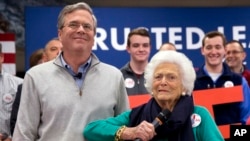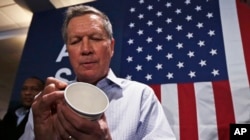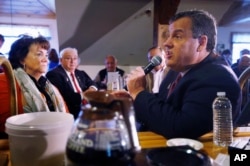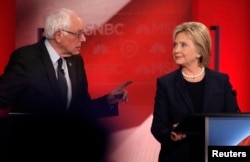U.S. presidential candidates traipsed through fresh-fallen snow in New Hampshire on Friday, trading barbs with each other four days ahead of the country's first-in-the-nation Republican and Democratic party primary elections.
New surveys in the small Northeastern state showed the two parties' contests tightening.
But the polls indicated that billionaire real estate tycoon Donald Trump still held a substantial lead over a large field of Republican rivals, while Bernie Sanders, the democratic socialist senator from the neighboring state of Vermont, maintained a large lead over former Secretary of State Hillary Clinton.
With some flights grounded, the snowstorm kept Trump from returning to New Hampshire from an out-of-state campaign rally. That gave one of his underdog challengers, former Florida Governor Jeb Bush, the son and brother of two former U.S. presidents, an opening to make fun of him, noting that even his 90-year-old mother, onetime first lady Barbara Bush, was out campaigning for him in the bad weather.
Bush sat with his mother on the "CBS This Morning" show, attacking the flamboyant Trump as misogynistic for his slurs against a debate moderator and occasional four-letter language at campaign appearances.
"I don't think a president would have ever shouted profanities in a speech in front of thousands of people with kids in the crowd," Jeb Bush said. "He does it all the time."
Kasich: 'More credibility'
Ohio Governor John Kasich, seeking to break into the top ranks of Republican contenders in Tuesday's contest, told one voter that as president he could replicate the success he'd achieved as both a governor and congressman.
"I think I have more credibility than someone who's never done squat," Kasich said of his rivals, without naming any of them.
New Jersey Governor Chris Christie has campaigned for months in the state and told voters they should be wary of Trump and two other candidates who trail the New York developer in the New Hampshire surveys, Texas Senator Ted Cruz and Florida Senator Marco Rubio, because they had not visited the state as often.
Christie contended that "if you reward those folks who don't show up here, there is no reason" the state should retain its tradition of holding the country's first presidential primary every four years.
The latest day-to-day tracking poll, done by the University of Massachusetts at Lowell and a local television station, showed Trump with 34 percent support, Rubio with 15 percent and Cruz, the winner of the Iowa party caucuses earlier this week, at 14 percent. Kasich and Bush both had 8 percent and Christie was at 5 percent.
Among Democrats, the survey showed Sanders with a 55 percent-to-40 percent lead over Clinton, the country's top diplomat from 2009 to 2013.
WATCH: What issues do New Hampshire voters care about?
A virtual tie
Nationally, another survey, by Quinnipiac University, showed the Clinton-Sanders contest in a virtual dead heat, with Clinton barely ahead at 44-42. That is a marked shift from poll results over the last several months that showed Clinton with substantial leads.
Quinnipiac said Trump, who came in second in the Iowa voting, was ahead nationally with 31 percent, compared with Cruz, a vocal conservative, at 22 percent, and Rubio at 19 percent.
The Republican candidates are set to debate Saturday night for the eighth time in the lengthy campaign, while Clinton and Sanders staged a spirited debate Thursday, their first one-on-one encounter since former Maryland Governor Martin O'Malley dropped out of the race after a poor showing in Iowa.
Clinton and Sanders bickered over who was the true progressive in the race and who was beholden to big-money interests.
Clinton called herself a "progressive who gets things done," saying the senator's proposals for free college and health care were promises that could not be kept.
"The numbers just don't add up," she said, adding that such ideas would raise taxes and make it hard for Americans to get ahead and stay ahead.
Done in other nations
Sanders said these were not radical ideas. He said just about every other developed nation has free public college and single-payer health care for its citizens.
He added that his proposal for free tuition would be paid for with a tax on Wall Street speculation, saying: "The middle class bailed out Wall Street in their time of need. Now, it is Wall Street's time to help the middle class."
The senator said Clinton once called herself a moderate. Sanders said no one can be a moderate and a progressive at the same time.
Clinton took offense when Sanders pointed out that she had received large speaking fees from large Wall Street financial firms. He said big money in politics and Congress was one major reason for high drug prices and energy policies that rely on fossil fuels and big oil.
Clinton called it an "artful smear" and rejected accusations that anyone getting big money was being "bought." Clinton said she had never changed a view or a vote because of any donation.









